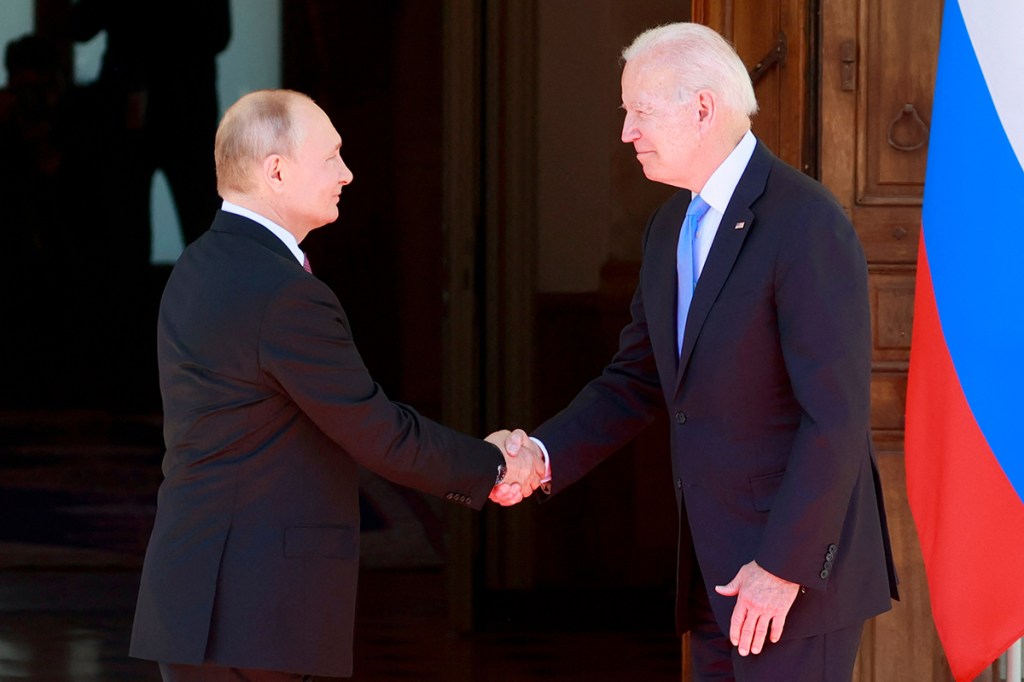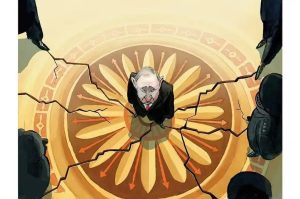When it is 1938 in Washington, it is already past midnight in Moscow. The clock is ticking and the map of Europe is being redrawn, but this is not a Munich moment. We are now past that, and past the time when the leader of a Western democracy might have the honesty to admit to his public, as Neville Chamberlain did in 1938, that he doesn’t want to fight a war over “a quarrel in a faraway country between people of which we know little.”
The shadow of Munich shames and intimidates the leaders of the Western democracies, and not without reason. But if there is a Munich moment in the latest Ukraine crisis, then it happened nearly seven years ago — in 2015, when the Obama administration backed the Minsk II accords and the dismemberment of Ukraine. If we are now condemned to repeat the unraveling of Europe in the 1930s, it is because we have failed to remember it correctly. What we are seeing is more like a Sudetenland moment.
The Minsk accords rewarded Putin’s invasion of the Crimea and parts of the Donbas in 2014 by assenting to a federal Ukraine. That would mean more than Ukraine never joining NATO or the EU — two dreams of overreach whose reckless promotion by the US, the EU and NATO helped to create the 2014 crisis. A federal Ukraine would mean the end of Ukraine’s sovereignty. The Russian-controlled regions in the east and south would be “Finlandized” and have a veto over the elected government in Kyiv. The whole of Ukraine would in time slide under Russian control, like Belarus. The fact that the accords collapsed merely kicked their inevitable outcome down the road — to now.
Minsk II was the work of Angela Merkel of Germany and Francois Hollande of France. No French leader had been in such a hurry to get to Moscow since Napoleon Bonaparte. As for the Germans, they’re always in a hurry to get to Moscow, one way or another. Olaf Scholz’s latest mission to Kyiv is of a part with the accommodations of Merkel and, before that, Gerhard Schroeder. The Franco-German subversion of Ukraine’s independence, then as now, is not an accident. It is the plan.
There is no need for Putin to invade Ukraine. He has already been promised “Finlandization” by Macron. When Olof Scholz went to Kyiv on Monday and demanded “signs of de-escalation” from Russia, he wasn’t defending Ukraine’s sovereignty: he was affirming the terms of its annexation. Just as Munich led to Germany annexing the majority-German Sudetenland from the recently-created independent Czechoslovakia, so Minsk II leads to the majority-Russian areas of the recently-created Ukraine. Putin is welcome to collect on the dividends of Minsk II, just so long as he spares us the embarrassment of invasion, which might force us to do something and would certainly break up what remains of the Western alliance.
A Democratic-led administration was fine with that in 2014. And a Democratic-led administration is fine with that now. Still, the Biden administration is talking up a war. This is partly because the commander-in-chief of the most powerful military in human history is a draft-dodging braggart who doesn’t want to be seen as weak. Instead, Biden vaunts the flaws that are the hallmarks of weakness: inflexibility, incoherence and aggression. But the management of revanchism in Europe is also, as Neville Chamberlain knew, the management of domestic perception for short-term political advantage.
The Biden administration, like its European allies, has no intention of fighting over Ukraine. Its goals are to dress up a strategic setback that it is powerless to prevent as a triumph of diplomacy, and to preserve what remains of its influence over France and Germany. Perhaps this is why Biden is more convincing when he threatens Germany, which Washington persists in seeing as a reliable ally, than when he threatens Russia, which Washington has converted into an unpredictable enemy.
Biden, in one of those dim ad-libs which will one day cause a really big war, said that if Russia invades Ukraine, the US will close the Nord Stream 2 pipeline. “We will bring an end to it,” Biden said. “I promise you.” He did not explain how he intends to become the first American president since FDR to identify cutting off the Germans’ fuel supplies as a strategic goal. Olaf Scholz, who was standing next to him at the time, didn’t say anything so specific. Perhaps that is because Biden was pointing to the outcome that his policies are hastening.
Biden’s bluster is leading to the end of NATO, an outcome that the French and Germans don’t seem to mind. But it’s also leading to an outcome that they will mind a great deal: an invitation to Putin to expand into the Baltics, breach the sovereignty of the EU, and confirm that Russia, not the US, has, after all, won the Cold War in Europe. Tick, tock.

























